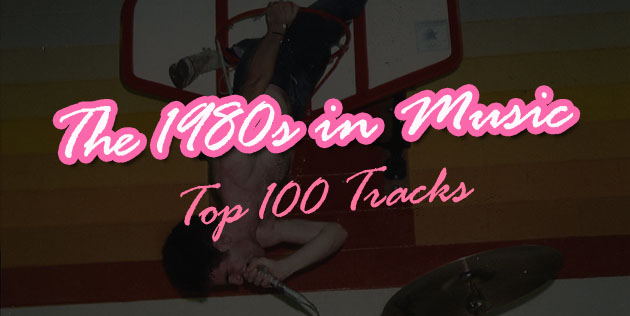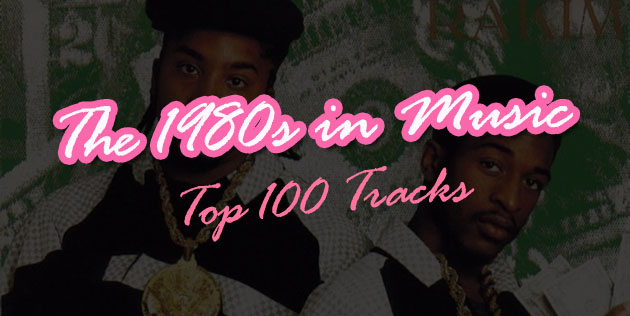
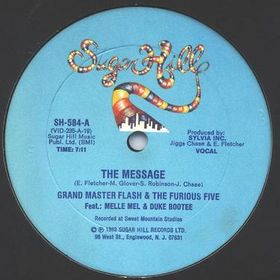
50.
Grandmaster Flash and the Furious Five
“The Message”
[Sugar Hill; 1982]
Grandmaster Flash & The Furious Five’s album The Message (not to be confused with the fourth book in the Animporphs series or the Isaac Asimov-penned short story) is one of the landmark hip hop albums to be released in the ‘80s. “The Message” peaked on the Billboard charts at 53 and is widely considered one of the earliest true hip hop releases.
‘90s babies would be incorrect assuming the instrumental of the title track was a Puffy song. Melle Mell has the distinction of the first recorded use of ”seditty” to describe a stuck up & misguided hood rat. Through the five verses on this iconic single, there are many lyrical gems which frequently get recycled in today’s hip-hop. In the evolution of the art of hip-hop, “The Message” was once on the cutting edge and the material holds up to this day.
– Marc Heilbrunn
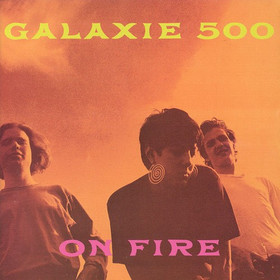
49.
Galaxie 500
“Blue Thunder”
[Rough Trade; 1989]
The EP version of “Blue Thunder,” augmented by Ralph Carney’s tenor saxophone, is a chaotic-yet-critical non-album cut. The sax elevates the track beyond the moody tone of its early stages, and imbues exuberant, golden sounds of shaky brass slicing through the song’s somber rays. Thankfully, the album version doesn’t suffer in the slightest, and it provides plenty to clamor about: the delicate guitar swell that dominates the track, Damon Krukowski’s rhythmic wallop like a slow-motion storm and, of course, Dean Wareham puts forth perhaps the finest vocal work of his lifetime. As the opening track, “Blue Thunder” firmly sets the tone throughout On Fire, as Wareham wails that he’ll “drive so far away” on Massachusetts’ Route 128, the same highway that Jonathan Richman immortalized over a decade earlier on “Roadrunner.” No matter the version, this remains one of the many great songs by the short-lived Boston dream pop trio.
– Michael Tkach
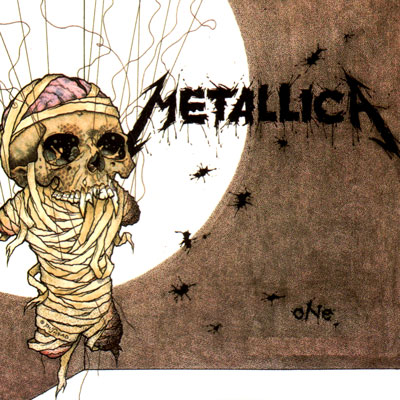
48.
Metallica
“One”
[Elektra; 1989]
The metal genre has always had a fascination with the “concept” in music. Some of the best albums and songs in the genre follow a story or retelling of a classic fable. Which makes sense, the genre has always had its roots in folklore, theatrics and storytelling. So it should come as no surprise that two of our highest ranked metal songs of the ‘80s are conceptual (see: “Hallowed Be thy Name by Iron Maiden). “One” was written about a novel/movie called “Johnny Got His Gun” which tells the story of a soldier who has his sight, legs, arms, voice, and hearing taken from him after being hit by an artillery shell. The character is then trapped within his own body as a prison, only able to think and get lost in the madness of his own thoughts. Just like the book, the song “One” chronicles the horrors of war. Similar to “Hallowed Be thy Name” the song has movements and builds up to an explosive conclusion, but not before first building on that tension. The song is dark, emotional and is perfect outlet to express the pain and suffering a solider might go through. The break down at the end with the double bass and the thrashing riffs are some of the most impressive guitar work in metal history. While “One” stands up on its own musically, the song has a lot more going on for it. It’s considered by many to be one of Metallica’s best songs in their canon, and one of the most iconic in metal.
– Brent Koepp
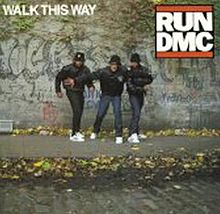
47.
Run-D.M.C.
“Walk This Way” (Feat. Aerosmith)
[Profile; 1985]
It’s pretty easy to forget the true cultural impact of music over time. “Walk This Way” has been played in so many bars for so many years that to some degree its significance seems tempered. But when Run-D.M.C. and Aerosmith joined forces in 1986, it served as a game-changing moment not just for both acts, but for the entire musical landscape. It immediately reestablished Aerosmith, who’d experienced a bit of a falling off from their massive success in the 1970s, and lent instant credibility to Run-D.M.C. as truly mainstream artists. The award-winning song remains one of the greatest rap-rock songs ever recorded and is often credited with helping to legitimize hip-hop.
– Andrew Bailey
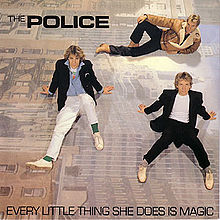
46.
The Police
“Every Little Thing She Does Is Magic”
[A&M; 1981]
The Police were known for blending reggae and punk, but this 1981 single is a pure, unadulterated pop gem. Sting, one of the preeminent pinup icons of the new-wave era, plays the part of an awkward teen without sounding put-on in the slightest, and he and the band cook up one of the most exhilarating yet straightforward tunes in their catalog.
– Sean Highkin
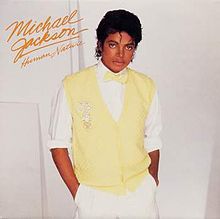
45.
Michael Jackson
“Human Nature”
[Epic; 1983]
Thriller became a worldwide phenomenon because of several things, all of which are well-documented: Quincy Jones’ brilliant production, the album’s groundbreaking music videos, Jackson’s breathtaking dance moves, a killer set of songs. But at its core, the thing that tied it together — and Jackson’s career, really — was the voice, as versatile and affecting as there has been throughout the history of pop music. And “Human Nature” is the ultimate showcase for that voice, a note-perfect ballad that allows MJ to growl and explore his upper register with equal assurance.
– Sean Highkin
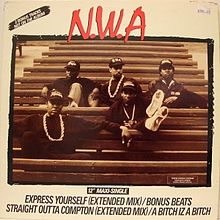
44.
N.W.A
“Express Yourself”
[Priority / Ruthless / EMI; 1988]
Out of all the tracks on Straight Outta Compton, “Express Yourself” is the sore thumb. The music is sampled from the Charles Wright and the Watts 103rd Street Rhythm Band’s track of the same name. It doesn’t feature the violent and profane lyrics heard on the rest of the album. Instead, the lyrics focus on freedom of expression. Dr. Dre criticizes other rappers who aren’t original, who aren’t true to themselves with lyrics like “Some musicians curse at home/ But scared to use profanity/ When up on the microphone/ Yeah, they want reality/ But you won’t hear none/ They’d rather exaggerate a little fiction.”
Dr. Dre also speaks out against smoking marijuana through the lyrics “I still express, yo I don’t smoke weed or a sess/ ‘Cause it’s known to give a brother brain damage/ And brain damage on the mic don’t manage nothing.” I still find it hilarious that the same man who spat out those words is the same man who put out The Chronic.
– Nicholas Preciado
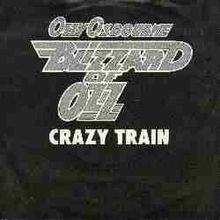
43.
Ozzy Osbourne
“Crazy Train”
[Jet / Epic; 1980]
“Crazy Train” is the most well known song that came out of Ozzy Osbourne’s solo career. It’s repeatedly played on radio stations all over the world and has been covered by artists like Michael Angelo Batio and Pat Boone. This track showed that Ozzy’s solo career was something to be taken seriously. It also introduced the world to Randy Rhoads and his ability to shred solos to pieces.
Lyrics like “One person conditioned to rule and control/ The media sells it and you live the role” and “Heirs of the Cold War, that’s what we’ve become/ Inheriting troubles, I’m mentally numb” show Ozzy’s contempt with the tensions of the Cold War and the effects left on the general public. But the Prince of Darkness still held onto hope, shown through “Maybe it’s not too late/ To learn how to love/ And forget how to hate.”
The Cold War might be over, but “Crazy Train” continues to go off the rails.
– Nicholas Preciado
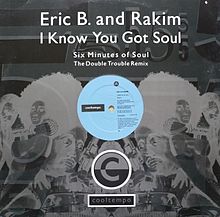
42.
Eric B & Rakim
“I Know You Got Soul”
[4th & B’way / Island; 1987]
Isaac Newton once famously said. “If I have seen further it is by standing on the shoulders of giants.” Eric B. & Rakim take that sentiment to heart on their 1987 single “I Know You Got Soul,” borrowing from Bobby Byrd and the Jackson 5 to create one of the most polished and charismatic hip hop tracks in history. The track’s title and vocals for the chorus were taken from Byrd’s 1971 single, and parts of the beat were taken from Jackson 5’s “I Want You Back.” Eric B.’s scratches and turntable techniques bring an original take to the track, and along with Rakim’s characteristically smooth rapping, “I Know You Got Soul” is sampling at its finest.
– Erik Burg
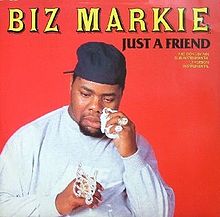
41.
Biz Markie
“Just a Friend”
[Cold Chillin ‘/ Warner Bros.; 1989]
I had a friend in college who, without fail, would always hijack the playlists at parties. And every time, also without fail, the first track he’d throw on would be Biz Markie’s “Just a Friend” – and we’d all feign annoyance or frustration and bemoan the lack of originality in his song choices, but no one ever went out of their way to turn the song off, mainly because we all secretly loved it. And that’s partly because there’s really nothing to dislike – unlike most other rap tracks from the era, it didn’t contain any filthy lyrics to offend listeners, had an uplifting beat, and its MC was both goofily charming and disarming with his weird sing-songy flow. The track ultimately became The Biz’s biggest hit, reaching number 9 on the Billboard charts, and he was lazily written off over the years as a one-hit wonder. But unlike “Ice Ice Baby,” it’s a hit most young artists would be proud to claim even decades later.
– John Ulmer

